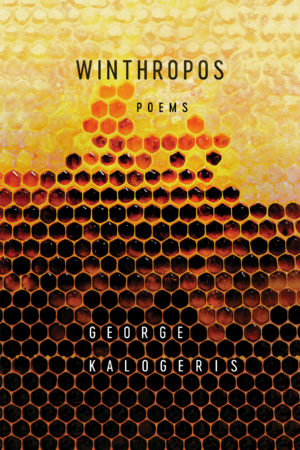Winthropos
by George Kalogeris
reviewed by Ilana Freedman
George Kalogeris has written poetry about growing up Greek American for years, but his forthcoming trilogy is something different. The first volume, Guide to Greece, borrows its title from Pausanias, who wrote tour guides of mainland Hellas. The speaker of the eponymous poem, “Guide to Greece,” asks the ancient whether he “might have seen them, / My elderly parents, somewhere in your travels.” Winthropos comes next; in it, antiquity and the present intertwine. The title is based on a pun his own father makes, adding an extra syllable to Winthrop, Massachusetts. The resulting name, Winthropos, echoes Anthropos—the answer to the Sphinx’s riddle.
Kalogeris finds poetry in the working-class city of his childhood, so much so that the speaker of “Speech Class” believes “It was poetry that made me late—for my life.” New England scenes—the kitchen, the classroom, the family grocery store, the cemetery, the hospital, the beach—offer unexpected glimpses into the Greek past, both modern and ancient. Mythic colors and tastes seep into the foods that Kalogeris ate as a boy. Butcher meat, melons in shipping crates, boiled, salted dandelions—the preoccupation with food is a continuation of Guide to Greece’s poems about basil leaves, filo pastry, and memorial wheat. “Honey” is equal parts wonderment and arithmetic:
How many cells of how many honeycombs
Does it take to fill a gallon jar of meli?
Enough for the hives to glow in two places. As if
The honeybees of Ákovos had flownTo Wínthropos.
Here “Wínthropos” takes the Greek accent of its parallel Greek village, Ákovos. But honey is not the only thing traveling between them. Two of the speaker’s cousins are shipped from Ákovos to Boston hospitals—first, a boy with a broken arm, and, years later, an adult dying of cancer. Kalogeris is often at his best when exploring painful memories like these. Off-beat meters and rhymes capture the past as it “congeals and uncongeals. / Heals and unheals.”
Some experiences dissipate, others are forgotten across distance, and still others are remade by age. The personae behind these poems also lose figures, real or imagined. For instance, a relative “as old as” the old man from the sea in Greek myth now walks the beach with the boy in “Proteus in Winthrop”:
I point to the islands and say the only thing
I ever remember saying to him: Elláda.His name for home. He nods to me by the waves.
In a week or so he’s gone. And then he’s the waves.
Like the ever-changing form of Proteus, the poem switches between Greek and English. This is no surprise—Kalogeris is an esteemed translator of George Seferis and C. P. Cavafy. The shades of these twentieth-century Greek poets still haunt this newest collection (for instance, its poignant English remaking of Cavafy’s “The Horses of Achilles,” which eternally weep for Patroclus).
Dead poets and their muses are not the only ones to guide the poet. His “old-school uncles” back in Greece (“My Guides”) push him towards marriage; his Greek teacher from Athens (“Berlitz School of Language”) stresses pronunciation, while his English teacher, Mrs. Segal (“Speech Class”), demands enunciation in “basement stalls where the dumb kids went.” After school, his father shows him how to spread sawdust beneath the chopping block to soak up blood (“Walk-In Freezer”). All grown up, the poet thinks back to what it was like to be a boy caught in the crosshairs of cross-cultural, intergenerational expectations. Lyric allows Kalogeris to reimagine growing up Greek and living in America. Figures from poetry, myth, and folklore help him to understand both his fortunate upbringing and his inherited traumas, to achieve a sense of belonging and acceptance that comes from experience.
Those interested in English-language poetry about Greek themes, or those already turned on to poets like Adrienne Kalfopoulou, Stephanos Papadapoulos, and A. E. Stallings, will be quick to add Winthropos to their list. Its raw yet tender approach to loss and longing is hard to forget. These poems about “Greekness” remind us of the many ways by which we define ourselves.
Published on April 21, 2022

